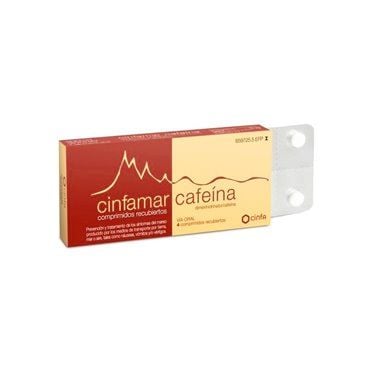Cinfamar Caffeine 50/50 Mg 4 tablets
Cinfamar caffeine is a medicine that is indicated in the prevention and treatment of the symptoms of dizziness produced by means of transport by land, sea or air, such as nausea, vomiting and / or dizziness for adults and children over 12 years of age.
Cinfamar caffeine is a medicine that is indicated in the prevention and treatment of the symptoms of dizziness produced by means of transport by land, sea or air, such as nausea, vomiting and / or dizziness for adults and children over 12 years of age.
Cinfamar Caffeine (50 Mg / 50 Mg 4 Coated Tablets)
Dimenhydrinate and caffeine
ACTION AND MECHANISM
- [ANTIEMETIC], [HISTAMINERGIC ANTAGONIST (H-1)], [MUSCARINIC CHOLINERGIC ANTAGONIST (M)]. Dimenhydrinate exerts an antiemetic effect probably due to antagonism of central histamine H1 and muscarinic receptors. Caffeine decreases the sedative effect of dimenhydrinate.
INDICATIONS
- Treatment of [NAUSEAS] and [VOMITING] associated with [DIZZINESS] in [KINETOSIS].
- [VERTIGO].
POSOLOGY
- Adults: 1-2 tablets before the trip. This dose will be repeated every 3-4 hours for the duration of the trip. In case dizziness has already appeared, 2 tablets should be administered in a single dose.
- Children: The safety and efficacy of this medicine have not been evaluated in children.
RULES FOR CORRECT ADMINISTRATION
It is recommended to take this medicine preferably 1-2 hours before the trip, and if not possible, at least 30 minutes before. The doses will be repeated every if necessary during the duration of the trip, respecting the recommended intervals.
CONTRAINDICATIONS
- Hypersensitivity to any component of the drug, including [XANTHINE ALLERGY].
- [ASTHMA CRISIS].
- [PORFIRIA]. H1 antihistamines have been associated with the appearance of porphyric outbreaks.
PRECAUTIONS
- [RENAL INSUFFICIENCY]. Accumulation of dimenhydrinate may occur, because it and its metabolites are excreted in the urine.
- [LIVER FAILURE]. Dimenhydrinate accumulation may occur due to its high hepatic metabolism.
- Patients suffering from [GLAUCOMA], [PROSTATIC HYPERPLASIA] or [URINARY BLADDER OBSTRUCTION], [ARTERIAL HYPERTENSION], [CARDIAC ARRHYTHMIA], [GRAVE MYASTENIA], [PEPTIC ULCER] stenosing or [INTESTINAL OBSTRUCTION]. Aggravation may occur from the anticholinergic effects of dimenhydrinate.
- Diseases of the lower respiratory tree, such as [ASTHMA], [PULMONARY EMPHYSEMA] or [CHRONIC OBSTRUCTIVE PULMONARY DISEASE]. H1 antihistamines may thicken bronchial secretions, due to their anticholinergic effects.
- [EPILEPSY]. Antihistamines have occasionally been associated with paradoxical hyperexcitability reactions.
- [APENDICITIS]. Due to its antiemetic effects, it could delay the diagnosis of appendicitis.
- Ototoxicity. Dimenhydrinate may ameliorate vertigo, tinnitus, and dizziness, thus it may mask ototoxicity induced by ototoxic drugs.
- Photosensitivity. Dimenhydrinate could lead to photosensitivity phenomena, so it is recommended not to sunbathe during treatment, and protect yourself with sun filters.
- Extreme temperatures. It could aggravate heat stroke due to decreased sweating caused by its anticholinergic effects. It is recommended to avoid exposure to very high temperatures and to follow adequate hygienic-dietary measures, such as adequate aeration and hydration.
ADVICE TO THE PATIENT
- This medicine will be administered together with food or drink.
- It is advisable to administer dimenhydrinate at least half an hour before the trip, and continue the doses throughout it if necessary, respecting the recommended dosage intervals.
- It can cause drowsiness, so it is recommended to exercise caution when driving, and not to combine it with drugs or other sedative substances such as alcohol.
- Patients on sedative drugs are not advised to self-medicate with dimenhydrinate products without consulting a physician.
- It is advisable not to sunbathe during the treatment.
- Any chronic pathology that the patient presents should be notified to the doctor before starting treatment.
- Exposure to extreme temperatures should be avoided during the use of this medicine, keeping in a cool environment, hydrating properly.
SPECIAL WARNINGS
- Dimenhydrinate could mask the ototoxic effects of some drugs, so it is recommended to periodically evaluate acoustic functionality in patients treated with these drugs.
- Before using this medicine in patients with vomiting of unknown origin, it is recommended to rule out the presence of appendicitis.
- It is recommended to monitor the patient's hydration in the event of a heat wave, and especially if the patient is a small child, an elderly person or a person with a serious illness.
- Due to the antiallergic effects of this medicine, it could give false negatives in dermal tests of hypersensitivity to antigenic extracts. It is recommended to suspend the administration of this medicine at least 72 hours before the test.
INTERACTIONS
Dimenhydrinate may mask ototoxic drug-induced symptoms by reducing vertigo or dizziness. Similarly, it could enhance the photosensitizing effects of other active ingredients that give rise to photosensitivity reactions. In addition, due to its activity, it could enhance the effects of other sedative and anticholinergic drugs.
PREGNANCY
The safety and efficacy of this medicine have not been evaluated in pregnant women. Its use is only advised in the absence of safer therapeutic alternatives.
LACTATION
Dimenhydrinate is excreted with milk, so due to the risk of adverse reactions in the infant, it is recommended not to use this medicine.
KIDS
Children are more sensitive to the side effects of H1 antihistamines. Caution is advised.
SENIORS
The elderly are more sensitive to the adverse effects of antihistamines. Caution is advised.
EFFECTS ON DRIVING
Dimenhydrinate can substantially affect the ability to drive and / or operate machinery, so caution should be exercised.
ADVERSE REACTIONS
Side effects are usually mild and transient, especially at the beginning of treatment.
- Digestive. [NAUSEA], [VOMITING], [DRY MOUTH], [CONSTIPATION].
- Cardiovascular. [TACHYCARDIA].
- Neurological / psychological. [DROWSINESS]. In young children and the elderly, [EXCITABILITY] may appear.
- Ophthalmological. [BLURRED VISION] and [MIDRIASIS] may appear.
- Allergic / dermatological. [HYPERSENSITIVITY REACTIONS], with [URTICARIA], [PRURITO], [EXANTEMATIC ERUPTIONS]. [PHOTOSENSITIVITY REACTIONS] may appear.
OVERDOSE
Due to its wide therapeutic margin, the appearance of adverse reactions is only expected in the case of a significant ingestion of tablets. Nervous depression and anticholinergic symptoms may appear. Treatment will be symptomatic, along with the usual elimination measures (See Dimenhydrinate).




